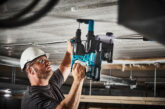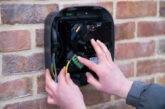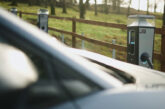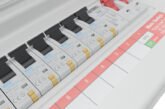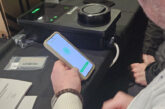
Chris Murray, Digital Power Tool Training Manager for Bosch, talks us through some of the flagship technologies involved with the brand’s most advanced platform and power tool range to date.
Bosch has a long and illustrious history across multiple sectors, but the company’s first point of departure from its original automotive roots was power tools. Indeed, the German manufacturing giant has an excellent heritage in SDS hammers in particular – having invented the concept of SDS itself – and can even claim to have developed the world’s first rotary hammer.
Today, around 80% of professional end users are purchasing cordless, with the levels of power and convenience in battery powered solutions improving exponentially in recent years. Indeed, performance is now equal to or greater than corded equivalents, even when using a 12 V system. Of that aforementioned 80%, around 90% of those cordless users are estimated to be on an 18 V platform.
With the goal for the tradesperson to make use of one system – where all their batteries are compatible with the tools they already own and use – loyalty to a battery system now plays a greater part than ever in the choice of power tool brand.
More than just batteries
It’s not all about batteries, of course, because Bosch is continually developing its technologies, and the manufacturer has been systematically updating its existing products with brushless motor models. As a result, the manufacturer can now point its customers towards a complete range of brushless combis and drill drivers.
The latest entry level brushless 18 V cordless combi, for example, is the GSB 18V-45 – where the 45 designation represents Newton Metres (Nm). As an indication of the additional performance accrued from brushless consider that it’s a lot smaller, but still more than twice as powerful as its brushed predecessor, which could generate only 21 Nm of torque.
Added to that is the GSB 18V-55, GSR 18V-55, GSB 18V-60 C, GSB 18V-90 C, GSB 18V-110 C and GSB 18V-150 C – all with brushless motors. Brushless motors are more efficient and can offer up to 30% longer runtime. With no carbon brushes to wear – and fewer moving parts – the lifetime is up to twice as long, and they’re more robust as machines.
Another considerable claim to fame is the first power tool with lithium-ion battery power. Introduced in 2003, the IXO ran a single 18,650 cell – 18x65mm in dimensions – and was a 1 Ah battery. The advantages of lithium-ion batteries are now well known, of course. They have very good power output and energy density. They can be charged quickly and discharged equally swiftly on heavy duty applications. The nemesis of any lithium-ion battery, however, is heat. Any battery of this type will heat up with use and its mitigation has required further technological innovations.
As a result, Bosch was very quick to pair lithium ion with battery management systems and electronic cell protection that will stop the machine if it’s in danger of overheating. Essentially, it regulates the amount of charge, discharge or current coming out of the battery, giving it up to four times longer lifetime and, again, is all part of a commitment to ensure that a power tool user’s investment is protected.
Cool runnings
The next advancement from the boffins in the Bosch R&D department was the Coolpack battery platform, launched in 2007. Here, a HDPE (High Density Poly Ethylene) material transfers the heat away from the cells. ProCORE is the latest leap forward in battery technology. Instead of utilising 18,650 cells that will deliver 45 A of current from a dual layer battery, it features an upgrade to 21,700 – or 21x70mm in dimensions. A physically bigger battery means it will store more energy and more current can be drawn from it – but why the need?
What end users have been demanding for some time is battery power that could run much larger and more powerful machines. Whilst its competitors have gone down the dual battery route, with two 18 V batteries powering a single tool, Bosch has rejected that solution and there are sound technical reasons for doing so.
Instead, the ProCORE battery platform will do the job very nicely with a single 18 V unit. A dual layer battery featuring 21,700 cells 90 A of current is available – double what was previously offered on the Coolpack generation. That increase requires a new battery design with copper contacts that benefit from lower internal resistance and better electrical transfer.
The original HDPE Coolpack configuration was also redesigned so that every cell is fully encapsulated in the material. Moreover, a Thermo Plastic Elastomer (TPE) sits alongside the copper contacts, conducting heat away from the side of the batteries. All of that technology comes together to produce a battery that is capable of discharging heat from all four of its sides.
ProCORE and BiTURBO
Armed with the new ProCORE battery, Bosch can power the bigger, more powerful machines that make up the new BiTURBO range. Not only does it promise corded equivalent power with just one 18 V battery but machines that can equally outperform tools in higher battery voltage classes.
BiTURBO tools also benefit from the latest safety features, including KickBack Control, Drop Control and Vibration Control. The range is flexible enough to be fully compatible with the rest of the Bosch 18 V battery platform and they can be run on a standard 18 V battery. With Bosch the message is clear: just one 18 V ProCORE battery will suffice on heavy duty applications.
The ProCORE range of batteries now includes a 5.5, 8, and 12 Ah unit. It’s important to note that the 4 Ah ProCORE is lighter and more compact than the standard Coolpack 18 V 4 Ah. It can do that because the aforementioned 21,700 cells can be arranged in a single layer, as opposed to a double layer of 18,650 cells in the Coolpack.
At the same time, if you need the maximum performance, the 4 Ah ProCORE battery isn’t recommended for a BiTURBO machine. The batteries that have been specifically designed for high draw applications would be the 5.5, 8 and 12 Ah.
Get more details about Bosch’s ProCORE battery platform and BiTURBO tool range here






